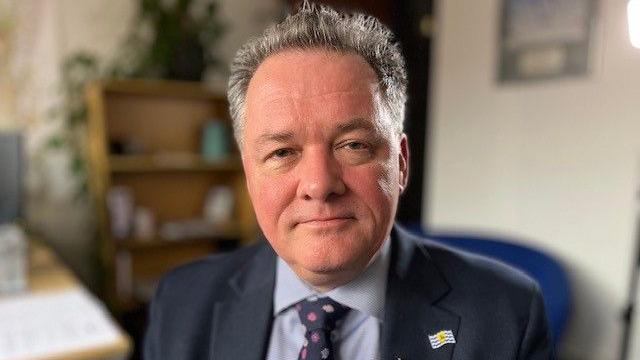Police and crime commissioners to be scrapped in England and Wales

- Published
Police and crime commissioners are to be scrapped in England and Wales to save £100m over this parliament, the government has said.
The Home Office said that less than 20% of voters can name their PCC, with Home Secretary Shabana Mahmood describing the system as a "failed experiment".
There are currently 37 elected commissioners under the system, introduced 12 years ago by former Conservative Prime Minister David Cameron.
The role will move to either an elected mayor or council leaders at the end of the commissioners' terms in 2028.
The Home Office said the saving will allow them to invest an extra £20m in front-line policing every year, which it said was enough for 320 constables.
Though its stated aim was to make forces more accountable to the areas they serve, the costs of the system and the effectiveness of commissioners has long been criticised.
Policing minister Sarah Jones told the Commons on Thursday that the model had "failed to live up to expectations" and "not delivered what it was set up to achieve".
She added that "public understanding [of PCCs' role] remains low despite efforts to raise their profiles."
Jones said PCCs had sought to provide strong oversight and tackle crime but the model "weakened local police accountability and has had perverse impacts on the recruitment of chief constables."
PCCs' main responsibilities include setting an annual budget, appointing chief constables, producing a five year policing plan, and assessing the performance of their force against the plan.
The Home Office said under the changes, measures to cut crime would be "considered as part of wider public services", including education and healthcare.
It added that the government would ensure support services for victims and witnesses currently provided by PCCs would continue.
Mahmood said the introduction of new reforms would make police accountable to their local mayoralties or councils.
Responding to the announcement in the Commons, shadow home secretary Chris Philp said it "represents a tinkering around the edges from a government which is failing on crime and policing".
He cited rises in crimes including shoplifting, as well as warnings from police forces of cuts to front line staffing due to funding shortfalls.
Emily Spurrell, the PCC for Merseyside and chair of the Association of Police and Crime Commissioners, said PCCs were "deeply disappointed by this decision and the lack of engagement with us".
She argued that the role had "improved scrutiny and transparency, ensuring policing delivers on the issues that matter most to local communities".
"Abolishing PCCs now, without any consultation, as policing faces a crisis of public trust and confidence... risks creating a dangerous accountability vacuum," she said.
But Chief Constable Gavin Stephens, chairman of the National Police Chiefs' Council, said the organisation could see "potential for stronger, more integrated local leadership on community safety" where the new system "is done well".
The Police Federation of England and Wales also welcomed the announcement.
Chairwoman Tiff Lynch said the "tens of millions of pounds" PCCs cost should instead be used to fund the police service "with experienced police officers who can afford to keep doing the job".
Related topics
- Published6 August

- Published17 May 2024

- Published19 April 2024
